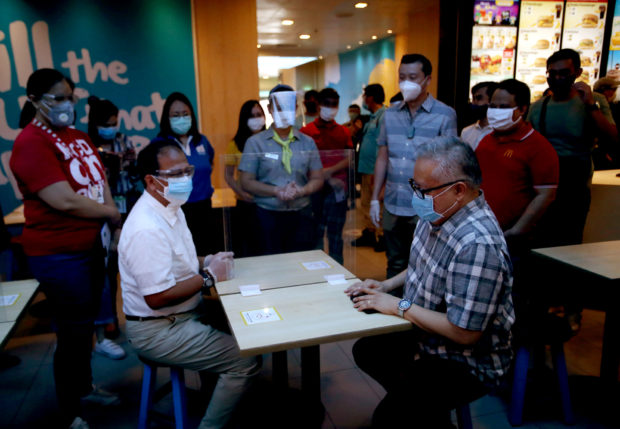
RESTAURANT VISIT National Task Force on COVID-19 chief implementer Secretary Carlito Galvez Jr. and Trade Secretary Ramon Lopez inspect a restaurant in SM North Edsa. —RICHARD A. REYES
MANILA, Philippines — Quarantine passes will no longer be required starting Monday when much of the country goes into a less restrictive general community quarantine,, Interior Secretary Eduardo Año said in a statement on Sunday.
He said, however, quarantine passes may still be required by local government units (LGUs) in areas identified as “critical zones” and “buffer zones,” where the risk of infection by the new coronavirus disease (COVID-19) remains high.
Other restrictions like curfew remains, Año said.
“We do not need a quarantine pass to be allowed to go out of our homes, but this is not ‘unli[mited],’ [such] that anytime [we want to leave], we can do so. Curfew hours will still be enforced by the LGUs, which can designate areas where a quarantine pass will be required,” Año said in his statement.
Lt. General Guillermo Eleazar, Joint Task Force COVID Shield commander, said in an interview with dzBB on Sunday that his unit would continue to enforce health regulations as set by the Inter-Agency Task Force on Emerging Infectious Diseases and by local ordinances.
Malacañang also appealed to the public to continue observing those rules.
‘Empathize with employees’
“Let us take care of each other by wearing face masks/face shields, maintaining physical/social distancing, staying at home if/when need be and avoiding crowded places, and the like,” presidential spokesperson Harry Roque said in a statement on Sunday.
Labor group Associated Labor Unions (ALU) on Sunday urged employers and business owners to allow their workers time to adjust to health and safety procedures as they return to work on Monday.
“[We] are asking employers to empathize with their employees, that they too are making the biggest sacrifice of their lives, hoping that in risking themselves to work today, they could keep their jobs, livelihoods, and [they] would be [able to] provide subsistence for their family and keep the business afloat [so that] the country’s economy [ay] recover amid the crisis,” said ALU spokesperson Alan Tanjusay in a statement.
ALU also appealed for lenient rules on tardiness to accommodate employees whose travel time will be exacerbated by the inadequate mass transport system and by longer health and safety measures along the way.
—WITH REPORTS FROM JEANNETTE I. ANDRADE, JULIE M. AURELIO AND TINA G. SANTOS